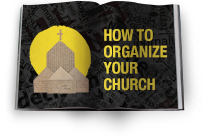Church Planters, Don’t Wait To Put Your Documents in Place!
We waited three years to put our church documents in order, and we suffered for it.
We had a statement of faith—we needed one for funding—but we didn’t know how to use it. No one ever encouraged us to adopt (and take seriously) a constitution or church covenant. Even if they did, I wouldn’t have listened.
Church documents seemed outdated and rigid. I wanted to reach the people who these “other churches” weren’t reaching. I wanted the people who didn’t like the church, the people who were looking for something different.
Three years in, we put documents in place—and it was painful.
By that time, we’d attracted a group of people, many of whom disdained the local church. We knew that we were against legalistic and rigid churches, but we did not know what kind of church we wanted to become. Everything seemed up for discussion and debate, including the inerrancy of Scripture and substitutionary atonement. With no concept, or ability, to exercise church discipline, sin went unchecked. Challenges didn’t work because everyone appealed to personal taste and would offer to “agree to disagree.”
After three years of this, it was pretty clear that we were sinking. If Jesus’ prayer was for unity in the church, his request didn’t seem to be answered in ours.
Finally, we put a few documents in place. Our statement of faith took a prominent role in establishing what the church believed the Bible teaches. After many conversations and much research, we established a church constitution. We found a time-tested church covenant that simply outlined what the Bible requires of all believers.
And in the months to follow many people left, some angry, others frustrated.
So . . .
Church planters, don’t wait three years to put some documents in place!
THE CHURCH IS A COUNTER-CULTURAL INSTITUTION
A restaurant may be organized a hundred different ways. The best of human wisdom can organize an excellent non-profit. But only Jesus can organize the local church. The Bible is where we find its organizing principles, and let me tell you: the church is quite the countercultural institution!
As you read the responsibilities that church members have for one another in passages like 1 Corinthians 5, or the leadership qualifications in 1 Timothy 3, you immediately get a profound sense that “flying by the seat of the pants” (as my mother would say) while organizing a new church just won’t do. Without clear biblical guidelines, the new church plant may very well blend with pop-culture, and grow in less-than-helpful ways.
Theological Fuzziness
Drawing theological lines seems counterintuitive in our postmodern era. However, church plants don’t naturally drift into orthodoxy. Not establishing doctrinal lines from the beginning causes the church to drift away from unity, integrity, and God’s revealed truth. As a result, the budding church will likely be distracted by endless debates on core issues such as inerrancy and substitutionary atonement instead of engaging in what the planter really wants to engage in: mission!
Ecclesiological Squishiness
Who leads the church? Who is a church member and what’s required of them? Who can serve in the church? Before our church organized, the diversity of answers we received to these questions was tremendous. Biblical church polity across the board is counter-cultural in society. Male eldership, congregational authority (for us Baptists), a baptized and regenerate church membership—these aren’t ideas that we just come up with on our own. A church with no guiding principles on church government will likely guide themselves right out of biblical faithfulness.
Moral Ambiguity
What is required of a church member, and who determines this? A church plant, without documents, sets up their new flock for confusion. Can a cohabiting couple become members? Can a man living in clear, unrepentant sin serve in a public ministry? How do we handle a sister rebelling against Jesus?
Without clear biblical documents, church plants will drift toward legalism or licentiousness. Legalistically, they may place upon their members spiritual requirements that Jesus himself does not place upon them. Alternatively, their members may be given over to sin, having embraced an unchecked licentious lifestyle.
Because sinful people are called to plant and organize local churches, we need guiding principles that transcend human wisdom. We need biblical guidelines from the start.
THIS IS WHAT A CHURCH IS, AND WHO WE NEED TO BECOME
As a pastor, I often have the opportunity to counsel engaged couples. As part of our pre-marital counseling, I always explain in detail the expectations and requirements of marriage. Can you imagine someone getting married, and discovering the expectations and requirements of marriage three years later?
Lack of forethought and clarity as to who the church is, and what the church does, will lead to endless divisions. Responding to those divisions with documents (three years later) will feel reactionary and people will leave. Starting off with the documents will say from the get-go: “This is what the church is, and this is what we need to become.”
Having documents at the beginning says: “We’re a people of the Book.”
Sometimes people ask, Isn’t the Bible enough?
Well, in a sinless world, perhaps, we would all agree on what the Bible teaches. But in a fallen world various interpretations abound. Biblically saturated documents communicate that a church plant’s vision is to be “built upon the foundation of the Apostles and Prophets” (Eph. 2:20).
By finally establishing documents, we were able to speak clearly to the people that God had given us, “This is what we believe the Bible says, and it’s on this foundation that we stand. We not only recognize the need for biblical church leadership, but we spell it out. Ultimately, our documents detail and cast a vision for who we as a church will become. We not only admit that the Bible calls for pastoral integrity, but we formally place ourselves under the accountability of the church. These documents will provide you, church, protection from renegade, spineless, and authoritarian church planters. We not only discuss what membership looks like but we detail what God requires of the Christian—and what we, as a church, expect. These documents provide instant help when dealing with unrepentant sin and church discipline cases. They provide a vision of discipleship of each of our church plant team members, as well as new converts. We not only preach Galatians 1:6 (that we must not turn to another gospel), but we use these tools to articulate what that one, true gospel is. These documents serve to protect the church from false teachers and wolves.”
TOOLS FOR DISCIPLESHIP
The Bible instructs churches to organize themselves in a way that flies in the face of current culture and fallen wisdom. Because of this, church plants need documents.
“We as a church grew significantly in spiritual health once we voted those (documents) in,” said one member who’s been with us since the beginning. It changed our church, and it changed our members. While some left, others responded positively, embraced the biblical vision, submitted themselves to the local church, and grew. Church planting is about making disciples, and documents are useful disciple-making tools.









